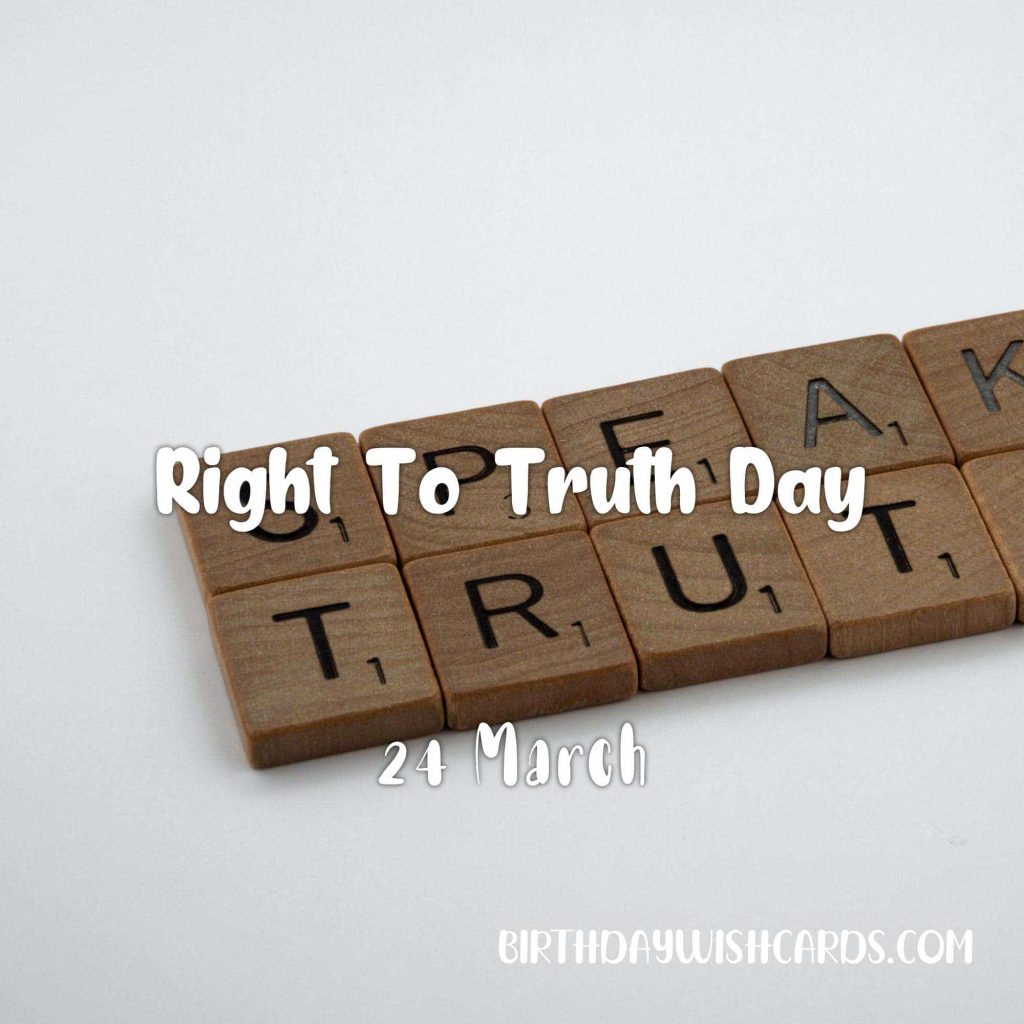24 March: International Day for the Right to Truth
Background of the Day
On 21 December 2010, the United Nations General Assembly officially designated 24 March as the International Day for the Right to the Truth regarding Gross Human Rights Violations and for the Dignity of Victims. This day underscores the vital role of truth in addressing human rights abuses and pays tribute to victims who have suffered such violations.
The choice of 24 March is deeply meaningful. It commemorates the anniversary of the assassination of Archbishop Oscar Arnulfo Romero of El Salvador in 1980. Archbishop Romero was a courageous advocate for human rights, known for his outspoken denunciation of injustice. He was tragically killed for his unwavering commitment to truth and justice.
In 2006, the Office of the United Nations High Commissioner for Human Rights (OHCHR) conducted a landmark study affirming the right to truth as an inalienable human right. This right is closely tied to the State’s duty to protect human rights, investigate violations, and ensure access to remedies and reparations for victims and their families.
Understanding the Right to Truth
The right to truth is especially significant in cases involving gross human rights violations and serious breaches of humanitarian law. It is fundamental for the families and loved ones of victims of summary executions, enforced disappearances, abductions, torture, and other grave abuses.
This right ensures that affected individuals can learn the full circumstances surrounding violations, including how and why they occurred and who was responsible. It provides a pathway to clarity, accountability, and understanding.
Pursuing the truth is not only about uncovering facts—it is also a powerful force for healing, both for victims and for society. As United Nations Secretary-General António Guterres has emphasized:
The Importance of the International Day for the Right to Truth
The International Day for the Right to Truth serves several essential purposes:
- Recognition: It honors victims of human rights violations and acknowledges the suffering endured by individuals and communities.
- Awareness: It raises global awareness about the importance of truth in achieving justice, reconciliation, and preventing future abuses.
- Advocacy: It highlights the responsibility of States and institutions to investigate violations and guarantee reparations, as required by international law.
By observing this day, the international community reaffirms its commitment to human rights, justice, and dignity. It serves as a reminder that accountability and transparency are essential foundations for peaceful and just societies.
Legal and Moral Framework Supporting the Right to Truth
The right to truth is firmly established in international human rights and humanitarian law. It is closely linked to other key rights, such as the right to justice, the right to reparations, and the prohibition of torture and enforced disappearance.
Several international instruments support the right to truth, including:
- The International Covenant on Civil and Political Rights (ICCPR), which obliges States to respect and protect civil and political rights, including the right to life and liberty.
- The United Nations Declaration on the Protection of All Persons from Enforced Disappearance, which explicitly recognizes the right to know the truth regarding enforced disappearances.
- The jurisprudence of international courts and human rights bodies, which consistently uphold the right to truth as a fundamental human right.
Challenges in Realizing the Right to Truth
Despite its recognition, the right to truth faces significant challenges worldwide. Key obstacles include:
- Impunity: Perpetrators of human rights violations often escape accountability, hindering truth-seeking efforts.
- Lack of political will: Some governments resist investigations or suppress information to avoid scrutiny.
- Threats to victims and witnesses: Individuals seeking the truth may face intimidation, harassment, or violence.
- Access to information: Evidence may be restricted or destroyed, making it difficult to uncover the full truth.
Overcoming these challenges requires strong legal frameworks, independent investigations, protection for victims and witnesses, and robust international cooperation.
Role of Truth Commissions and Investigative Bodies
Truth commissions and similar investigative bodies are instrumental in advancing the right to truth. These mechanisms are established to uncover facts about past human rights abuses, provide victims with a platform to share their experiences, and recommend measures to prevent recurrence.
Notable examples of successful truth commissions include:
- The Truth and Reconciliation Commission of South Africa, which facilitated the country’s transition from apartheid to democracy.
- The Commission for Truth and Reconciliation in Guatemala, which investigated abuses committed during the country’s civil war.
Such bodies foster healing and reconciliation by promoting transparency, accountability, and social cohesion.
How to Observe the International Day for the Right to Truth
Individuals, organizations, and governments can mark this important day through a variety of meaningful actions:
- Educational campaigns: Promote awareness of the right to truth through seminars, workshops, and social media initiatives.
- Memorial events: Honor victims and survivors of human rights violations with commemorative ceremonies.
- Advocacy: Support stronger policies and legislation that enable investigations and reparations.
- Support for victims: Provide platforms and resources to amplify the voices of victims and their families.
Global Impact and the Path Forward
The International Day for the Right to Truth is a powerful reminder of the

